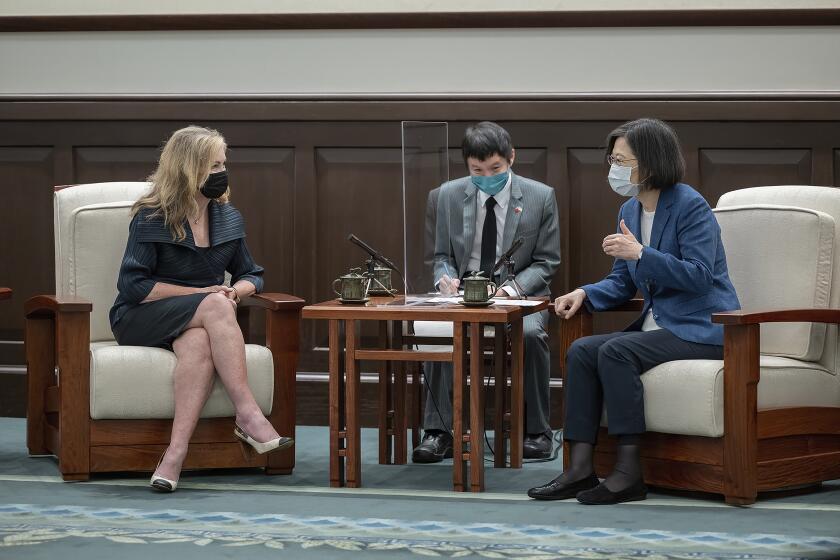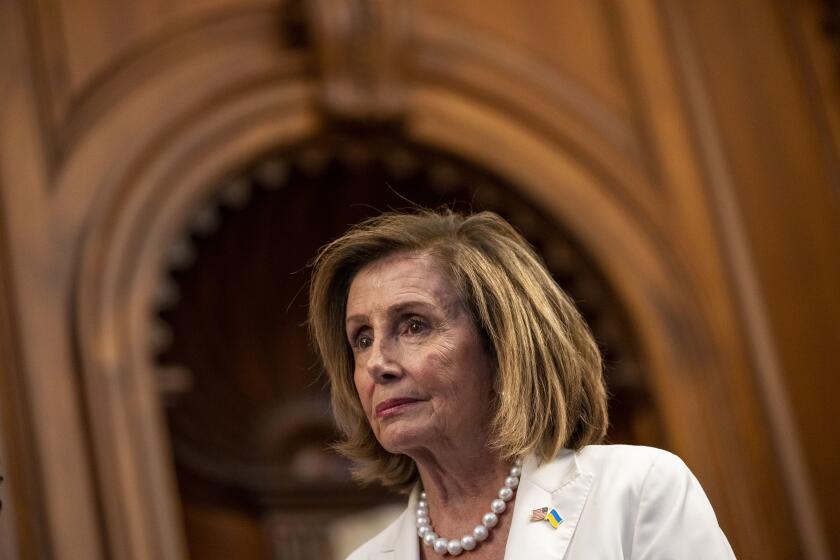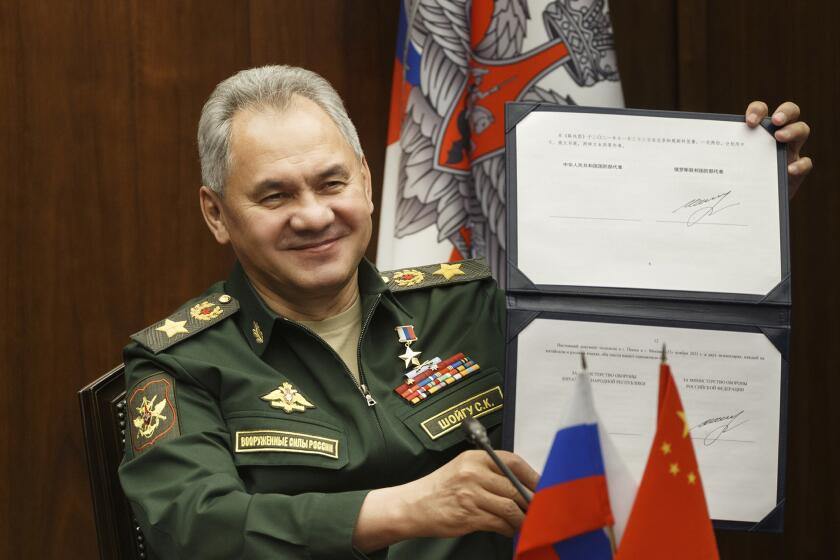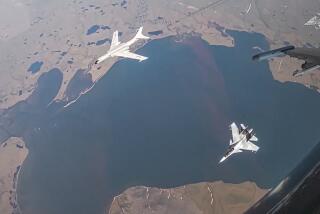Russia launches war games with China amid growing tensions for both with the U.S.
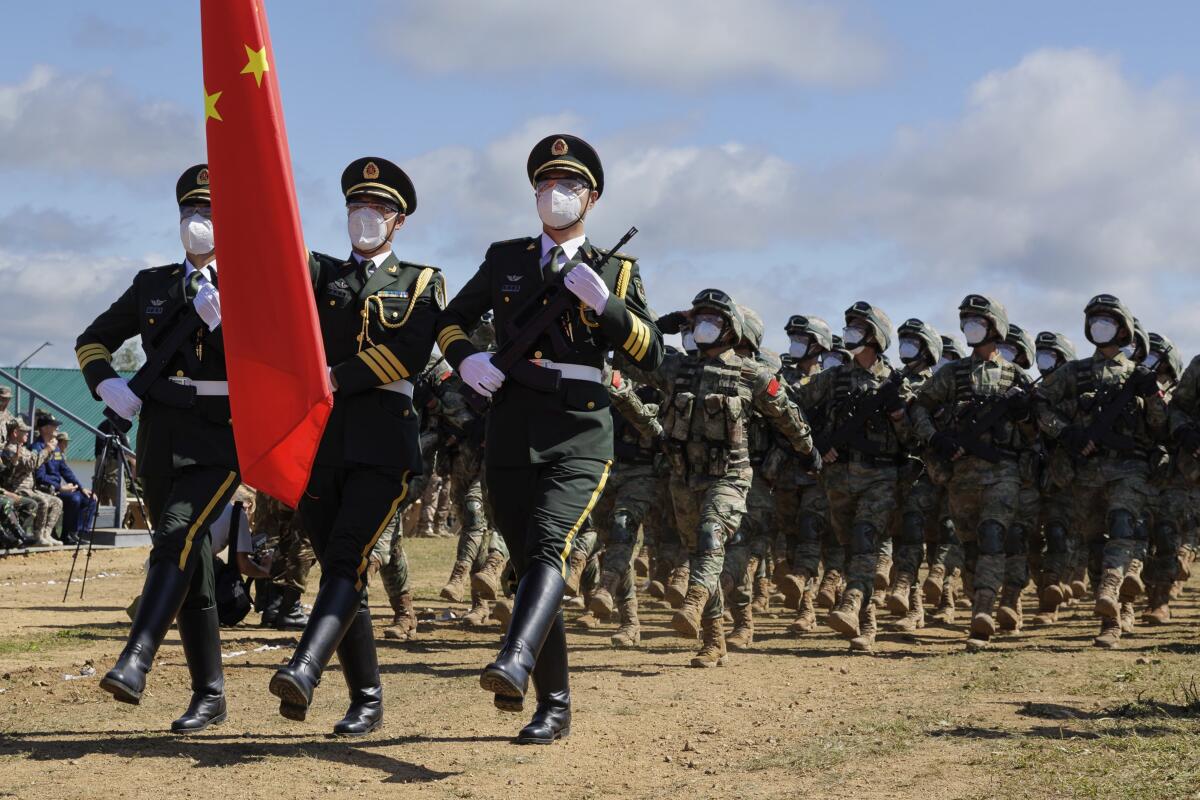
- Share via
MOSCOW — Russia on Thursday launched weeklong war games involving forces from China and other nations in a show of growing defense cooperation between Moscow and Beijing as both confront tensions with Washington.
The maneuvers are also intended to demonstrate that Russia has sufficient military might for massive drills even as its troops are engaged in warfare in Ukraine.
The Russian Defense Ministry said that the Vostok 2022 (East 2022) exercises will be held until Wednesday at seven firing ranges in Russia’s Far East and the Sea of Japan, and will involve more than 50,000 troops and 5,000 weapons units, including 140 aircraft and 60 warships.
The chief of the Russian General Staff, Gen. Valery Gerasimov, will personally oversee the drills involving troops from several former Soviet nations as well as China, India, Laos, Mongolia, Nicaragua and Syria.
The Defense Ministry noted that, as part of the maneuvers, the Russian and Chinese navies in the Sea of Japan will “practice joint action to protect sea communications, areas of marine economic activity and support for ground troops in littoral areas.”
Beijing sent more than 2,000 troops along with more than 300 military vehicles, 21 combat aircraft and three warships to take part in the drills, Chinese news reports said.
During a visit by a U.S. senator, Taiwan’s leader says China and Russia are ‘disrupting and threatening the world order’ with Beijing’s nearby military exercises and Moscow’s Ukraine invasion.
China’s Global Times newspaper noted that the maneuvers marked the first time that China has sent forces from three branches of its military to take part in a single Russian drill, in what it described as a show of the breadth and depth of Sino-Russian military cooperation and mutual trust.
The drills showcase increasing defense ties between Moscow and Beijing, which have grown stronger since Russian President Vladimir Putin sent his troops into Ukraine on Feb. 24. China has pointedly refused to criticize Russia’s actions, blaming the U.S. and NATO for provoking Moscow, and has blasted the punishing sanctions imposed on Moscow.
Russia, in turn, has strongly backed China amid the tensions with the U.S. that followed a recent visit to Taiwan by U.S. House Speaker Nancy Pelosi (D-San Francisco).
Putin has drawn parallels between U.S. support for Ukraine and Pelosi’s trip, describing them both as part of alleged efforts by Washington to foment global instability.
The prospect of Pelosi’s departure has some considering the power vacuum she would leave, and what it would mean for California’s influence in D.C.
Alexander Gabuyev, a political analyst who closely follows Russia-China ties, noted that “it’s very important for Beijing to show to the U.S. that it has levers to pressure America and its global interests.”
“The joint maneuvers with Moscow, including the naval drills, are intended to signal that, if the pressure on Beijing continues, it will have no other choice but to strengthen the military partnership with Russia,” Gabuyev said. “It will have a direct impact on the interests of the U.S. and its allies, including Japan.”
He noted that the Kremlin, for its part, wants to show that the country’s military is powerful enough to flex its muscle elsewhere despite the campaign in Ukraine.
“The Russian leadership demonstrates that everything goes according to plan and the country and its military have resources to conduct the maneuvers along with the special military operation,” Gabuyev said.
Russia and China, in committing to closer military ties, point to increasingly frequent U.S. strategic bomber flights near both countries’ borders.
The exercises continue a series of joint war games by Russia and China in recent years, including naval drills and patrols by long-range bombers over the Sea of Japan and the East China Sea. Last year, Russian troops for the first time deployed to Chinese territory for joint maneuvers.
China’s participation in the drills “aims to deepen pragmatic and friendly cooperation between the militaries of the participating countries, enhance the level of strategic cooperation among all participating parties and enhance the ability to jointly respond to various security threats,” Chinese Defense Ministry spokesperson Col. Tan Kefei said last week.
Putin and Chinese President Xi Jinping have developed strong personal ties to bolster a “strategic partnership” between the former communist rivals as they both are locked in rivalry with the U.S.
Even though Moscow and Beijing in the past rejected the possibility of forging a military alliance, Putin has said that such a prospect can’t be ruled out. He also has noted that Russia has been sharing highly sensitive military technologies with China that helped significantly bolster its defense capability.
More to Read
Sign up for Essential California
The most important California stories and recommendations in your inbox every morning.
You may occasionally receive promotional content from the Los Angeles Times.
